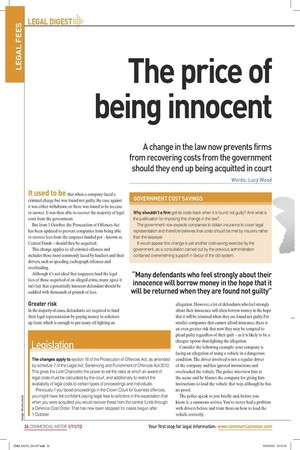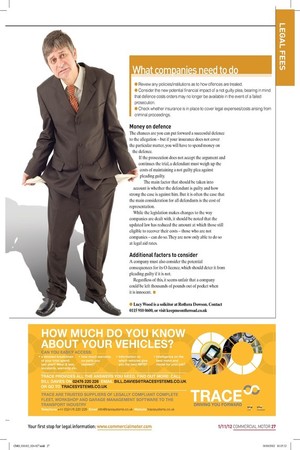The price of being innocent
Page 19

Page 20

If you've noticed an error in this article please click here to report it so we can fix it.
A change in the law now prevents firms from recovering costs from the government should they end up being acquitted in court
Words: Lucy Wood It used to be that when a company faced a criminal charge but was found not guilty, the case against it was either withdrawn, or there was found to be no case to answer. It was then able to recover the majority of legal costs from the government.
But from 1 October, the Prosecution of Offences Act has been updated to prevent companies from being able to recover fees from the taxpayer-funded pot – known as Central Funds – should they be acquitted.
This change applies to all criminal offences and includes those most commonly faced by hauliers and their drivers, such as speeding, tachograph offences and overloading.
Although it’s not ideal that taxpayers fund the legal fees of those acquitted of an alleged crime, many agree it isn’t fair that a potentially innocent defendant should be saddled with thousands of pounds of fees.
Greater risk
In the majority of cases, defendants are required to fund their legal representation by paying money to solicitors up front, which is enough to put many off fighting an allegation. However, a lot of defendants who feel strongly about their innocence will often borrow money in the hope that it will be returned when they are found not guilty. For smaller companies that cannot afford insurance, there is an even greater risk that now they may be tempted to plead guilty regardless of their guilt – as it is likely to be a cheaper option than fighting the allegation.
Consider the following example: your company is facing an allegation of using a vehicle in a dangerous condition. The driver involved is not a regular driver of the company and has ignored instructions and overloaded the vehicle. The police interview him at the scene and he blames the company for giving him instructions to load the vehicle that way, although he has no proof.
The police speak to you briefly and, before you know it, a summons arrives. You’ve never had a problem with drivers before and train them on how to load the vehicle correctly.
GOVERNMENT COST SAVINGS
Why shouldn’t a firm get its costs back when it is found not guilty? And what is the justification for imposing this change in the law?
The government now expects companies to obtain insurance to cover legal representation and therefore believes that costs should be met by insurers rather than the taxpayer.
It would appear this change is yet another cost-saving exercise by the government, as a consultation carried out by the previous administration contained overwhelming support in favour of the old system.
Legislation
The changes apply to section 16 of the Prosecution of Offences Act, as amended by schedule 7 of the Legal Aid, Sentencing and Punishment of Offences Act 2012. This gives the Lord Chancellor the power to set the rates at which an award of legal costs must be calculated by the court, and additionally to restrict the availability of legal costs to certain types of proceedings and individuals.
Previously if you faced proceedings in the Crown Court for business offences, you might have felt confident paying legal fees to solicitors in the expectation that when you were acquitted you would recover these from the central funds through a Defence Cost Order. That has now been stopped for cases begun after 1 October.
What companies need to do
• Review any policies/institutions as to how offences are treated.
• Consider the new potential financial impact of a not guilty plea, bearing in mind that defence costs orders may no longer be available in the event of a failed prosecution.
• Check whether insurance is in place to cover legal expenses/costs arising from criminal proceedings.
Money on defence
The chances are you can put forward a successful defence to the allegation – but if your insurance does not cover the particular matter, you will have to spend money on the defence.
If the prosecution does not accept the argument and continues the trial, a defendant must weigh up the costs of maintaining a not guilty plea against pleading guilty.
The main factor that should be taken into account is whether the defendant is guilty and how strong the case is against him. But it is often the case that the main consideration for all defendants is the cost of representation.
While the legislation makes changes to the way companies are dealt with, it should be noted that the updated law has reduced the amount at which those still eligible to recover their costs – those who are not companies – can do so. They are now only able to do so at legal aid rates.
Additional factors to consider
A company must also consider the potential consequences for its O-licence, which should deter it from pleading guilty if it is not.
Regardless of this, it seems unfair that a company could be left thousands of pounds out of pocket when it is innocent. ■ • Lucy Wood is a solicitor at Rothera Dowson. Contact 0115 910 0600, or visit keepmeontheroad.co.uk











































